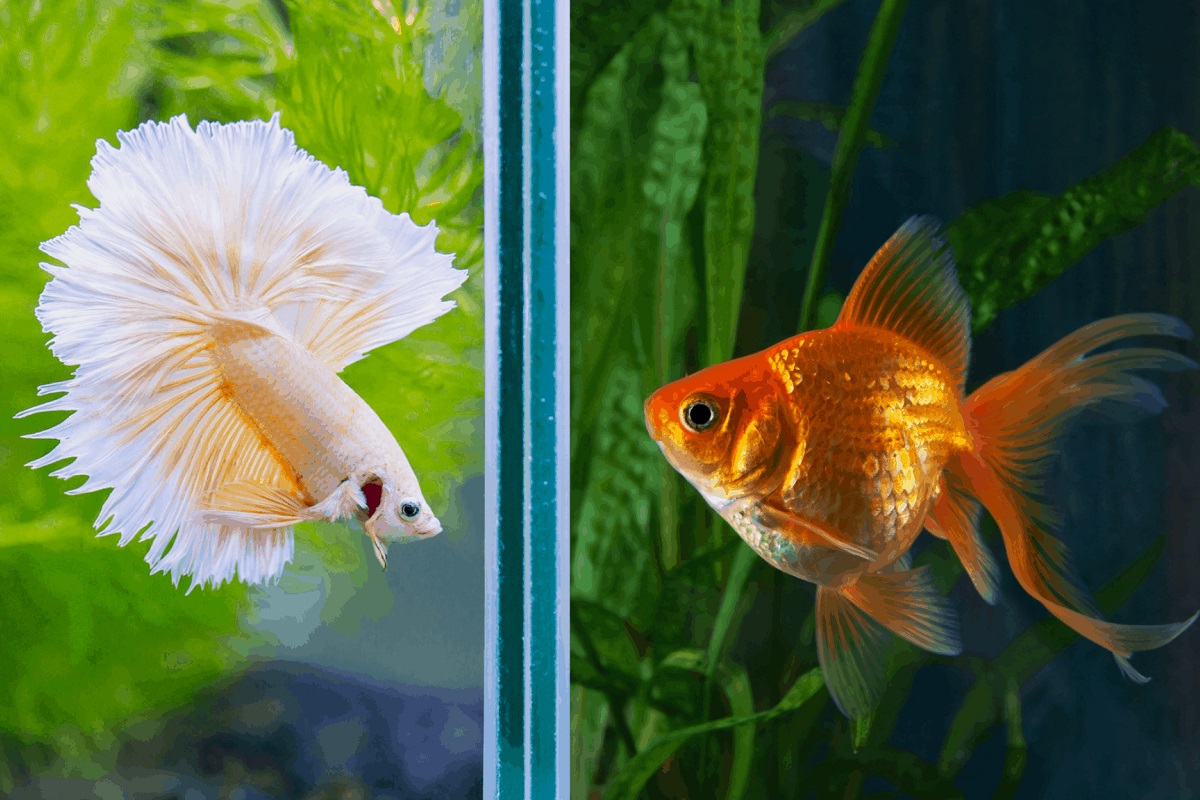It’s understandable why you’d want to put betta fish and goldfish in the same tank—both of these species have brilliant colors that complement one another.
Unfortunately, there are many more nuances to having bettas and goldfish cohabitate than just colors. We’ll cut to the chase: Having betta and goldfish live together is a bad idea.
Between the betta fish’s aggressive nature and these fish having different water temperature preferences, it’s best to keep them in separate tanks unless an emergency forces you to have them temporarily live together.
Contents
Should You Have Betta Fish With a Goldfish?
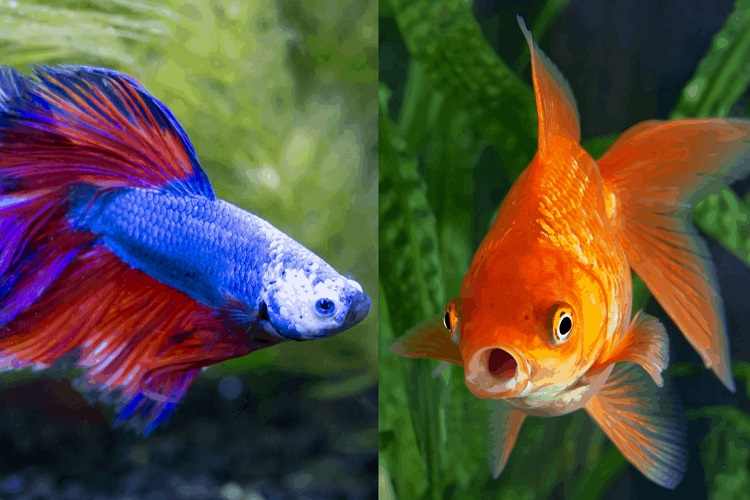
No, you shouldn’t have betta fish with a goldfish. Although you can make it work in dire circumstances, having these two fish species together can cause them emotional and physical harm.
Unlike betta fish, goldfish are social creatures. However, fellow goldfish and many other fish species make better tank mates for goldfish than betta fish.
Potential Problems With Betta and Goldfish Living Together
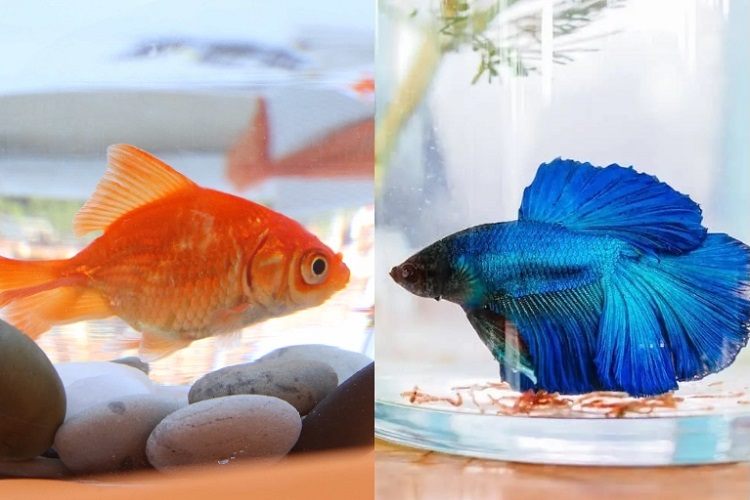
You may encounter several problems at the same time by having a betta and goldfish living together in the same tank. Below are the most notable reasons why you should keep these fish separated.
They Require Different Water Parameters
Designing a fish tank around a species’ preferred water parameters is crucial to keep them healthy. Fish with the proper water conditions will have less chance of getting parasites, bacterial infections, and other ailments.
Unfortunately, goldfish require colder water than betta fish. Goldfish originate from cooler waters in China; they prefer water temperatures between 68°F to 74 °F.
In contrast, betta fish are from warmer and more still water in Thailand. So, a betta’s ideal water temperature starts at 75 °F and ranges into the low 80s.
Betta Fish Could Become Food
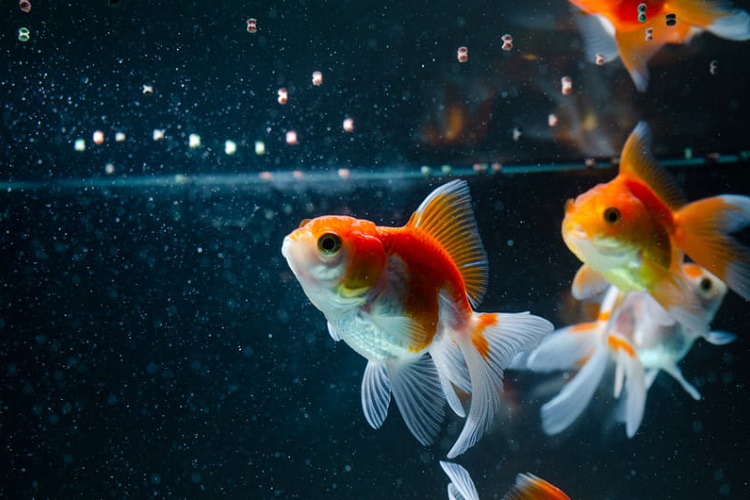
A wide variety of goldfish exists in a range of sizes. So when you’re considering putting a betta fish and goldfish together in the same tank, it’s essential to consider the goldfish’s size, given that they’re omnivores.
The largest goldfish on record is 18.7 inches long. A goldfish that’s even half this size would likely view your betta fish as a tasty treat.
So, we encourage you to use common sense. If your goldfish seems large enough to eat your betta, it’s best to keep them in a separate tank.
They Have Different Dietary Needs
Goldfish enjoy eating plants and marine protein, whereas bettas have an almost entirely strict protein diet. So, you’ll need to feed your betta and goldfish separate food to ensure they each maintain optimal health.
The issue is that these fish will inevitably eat each other’s food. That’s especially the case with goldfish, given that having a partially carnivorous diet runs through their veins.
If either of your fish constantly eats a diet that’s abnormal for their needs, they could have health problems. Therefore, if you house betta and goldfish together, try your best to give them their food on different sides of the tank.
You should also remove any leftover food after a few minutes so that they don’t pick at it in the substrate.
Betta Fish Are Aggressive
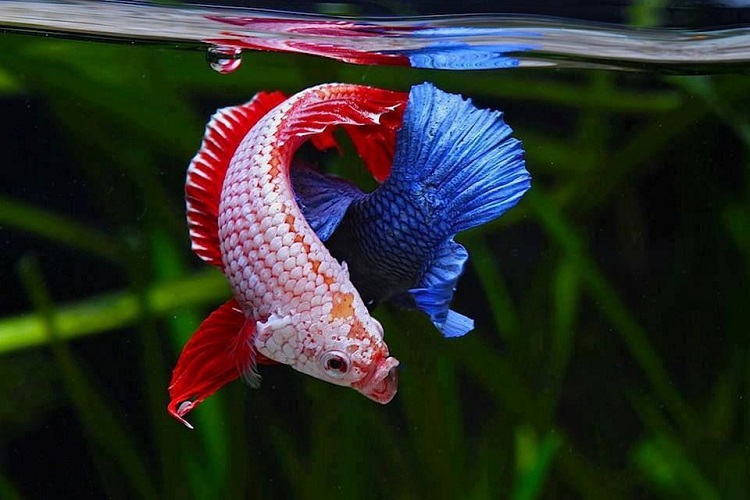
There’s a reason you always see betta fish in solitary tanks at the pet store—they’re notorious for their aggression. That’s why they also go by the name the Siamese fighting fish.
On the other hand, goldfish are docile creatures. Unless they’re hungry, of course, and your betta fish is the right size for them to eat.
In either case, it’s common for betta fish to chase a goldfish around their shared tank. Betta fish will try to nip at your goldfish’s fins, opening the opportunity for infections if they grab a bite.
Goldfish won’t tolerate your betta fish’s nips, though. So, you can expect to see them chasing your betta fish in response, also trying to nip at its fins.
The result is often two unhealthy-looking fish, both of which will have increased stress levels from being unable to rest in a peaceful tank. However, there are a few select tank mates that are more suitable for betta fish.
You’ll Need a Large Tank
If you’re short on space in your house, bringing home a goldfish to join your betta fish isn’t the solution.
Many goldfish species grow significantly larger than bettas. Therefore, they require a bigger aquarium for swimming and diluting the waste that they’ll be producing so that you avoid a dangerous ammonia build-up.
Should you have a large enough area and the funds to buy a bigger tank, we recommend going really big to keep your betta and goldfish as happy as possible.
Is It Possible to Make Them Live Together?
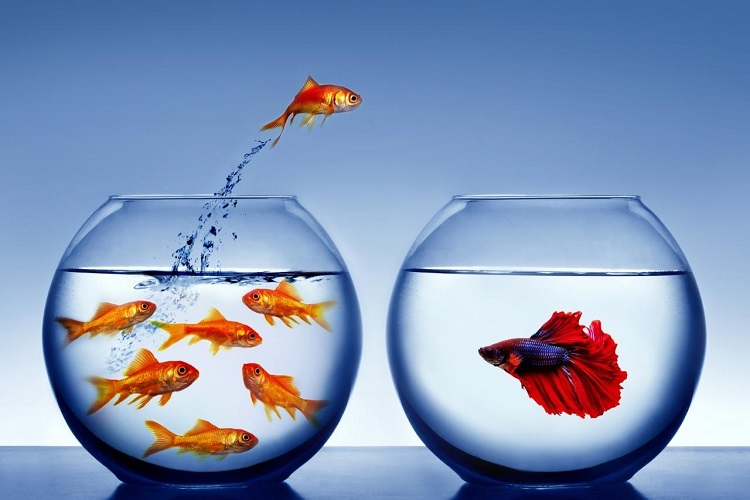
It’s possible—though not ideal—for betta and goldfish to live together. Instead of making this a permanent plan, it’s better to approach it in an emergency.
For example, if the filter goes out in your betta’s tank, transferring them to your goldfish’s tank might be okay while you work on fixing it.
However, before allowing a betta and goldfish to reside in the same tank regardless of the situation, it’s crucial to ask yourself the following:
- Is my goldfish big enough to eat my betta?
- Is the water temperature in the 74 to 75 °F range?
- Do they have hiding places in the tank?
- Will I try to feed them in separate areas?
Although betta fish are seemingly fighters by nature, it’s uncommon for them to actively attack fish in the wild unless they come too close to their territory.
So, if you decide to have your betta and goldfish live together, giving them a massive tank so that they can steer clear of each other is one of the best ways to keep them comfortable.
Conclusion
The golden rule of thumb is keeping betta fish in their own tank. These fish don’t need to socialize with other fish to have a happy life, although they require a larger tank than the small ones you see in stores—at least five gallons per fish is ideal.
In contrast, goldfish are docile, social fish that get along with their own species and many other types of fish. But the betta fish isn’t an ideal tank mate for them because of a betta’s aggression and different water parameters.

Ian Sterling, founder of Fishlab.com, began his aquarium journey over 30 years ago, driven by a deep fascination for fish and their diverse personalities. His website, Fishlab.com, is dedicated to making fishkeeping accessible and enjoyable, offering beginner-friendly guidance, expert insights, and a community for aquarists to connect and share experiences.


